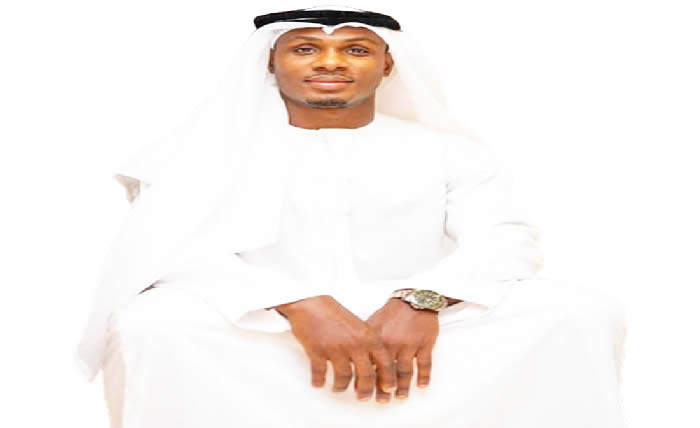
ANTHONY NLEBEM chronicles Odion Ighalo’s childhood from a Lagos ghetto, after the striker recently added the Saudi King’s Cup gold medal to his silverware
Who would have thought that a kid born and raised in Lagos ghetto Ajegunle, would one day become one of Africa’s biggest footballers globally?
Well, that’s the case of Odion Ighalo, one of Nigeria’s most successful footballers of the last decade.
The striker currently features for Saudi Arabian giants and Asia’s most decorated club Al Hilal after a career in Europe that saw him playing topflight football for clubs in Norway, Italy, Spain and England, as well as China.
For the 33-year-old, it’s been a tortuous journey to the pinnacle of global football, a grass-to-grace story of sheer determination, hard work and the desire to succeed, which has earned him his latest trophy, the King’s Cup in the oil-rich Saudi Arabia.
Born to a baker dad, Paul, and a petty trader mum, M.S. Ighalo, rising from the slums of Lagos to becoming a recipient of the King’s Cup gold medal in Saudi Arabia wasn’t ever going to be an easy task.
Surviving in poverty-stricken Ajegunle, where life of crime and drugs reigned supreme among youths, was always going to be a grueling task, no doubt.
The footballer admits a close shave with death in his neigbourhood, while playing for his first club Olodi Warriors at the famed ‘Maracana Stadium.’
“We had bad gangs going into the ghetto, taking marijuana and all that. I remember when we were training some people who stole would have to cross through the field and police were shooting guns,” Ighalo told CNN.
“We had to run and bend down because a stray bullet can hit anybody. I was young then — I was so afraid that day.”
After Olodi Warriors, he had stints at Prime FC of Osogbo and the defunct Julius Berger on the domestic scene, before a move abroad to Norwegian side Lyn Oslo in 2007.
Ighalo scored nine league goals in 20 games in just one season in the Scandinavian country, but his impressive statistics caught the eye of scouts of Italian Serie A side Udinese in 2008.
But settling down to life in Italy’s tough topflight didn’t come easy, as he managed just six league games and one goal in the 2008/09 season.
He was shipped off on loan deals to sister clubs Granada (twice) and Watford (once), as well as Cesena for the next four seasons.
The loan move to Watford in the Championship — in the 2014/15 season — turned out to be the right decision, as Ighalo’s career found its way back to the right path.
With three goals scored in his first four starts in the English second tier, the Hornets snapped up Ighalo on a permanent deal just the day after the frontman was finally released from parent club Udinese.
Exactly three months later, he scored four-second-half goals and was voted Man of the match in a 7–2 home routing of Blackpool. He took his league tally to 14 on February 10, 2015, after netting a brace to help his team come from behind at Brentford to win 2–1.
His goals fired Hornets back to the Premier League the following season after an eight-year wait and Ighalo continued from where he stopped in the Championship, scoring on his EPL debut on August 8, 2015, replacing José Manuel Jurado 16 minutes from time and putting the visitors ahead 2-1 in an eventual 2-2 draw away against Everton for the season opener.
He netted twice in a 2-0 home win over West Ham United on October 31, reaching seven goals for the season and becoming the highest club scorer in the competition after just 11 matches.On December 20, Ighalo scored in a Watford victory for the fourth consecutive time, netting a brace in a 3-0 win over Liverpool, his five-goal haul earning him December’s Premier League Player of the Month.
In January 2017, Ighalo switched to the money-spinning Chinese Super League club Changchun Yatai for a reported £20m, before moving to Shanghai Shenhua after Yatai’s relegation.
January 31, 2020 would then mark a historic moment in his career, when he became the first Nigerian to file out for the Red Devils after a loan move from Shenhua to help the struggling English giants solve their striking problems.
It was a dream move for the Lagos-born, who supported United growing up and nursed the hope of playing for them some day.
“It was very dramatic,” he told the United website. “My agent called me the day before and said Man United … A few other clubs had shown interest, so I said, ‘Please, just pick United, if it’s going to be possible.’
“At 11pm in Shanghai, my agent called me (to say) that United wanted to do the deal… I didn’t sleep throughout that night.
“There was paperwork, negotiating and all that … So, we are talking and other teams are calling them, wanting me, but I told my agent that this is what I want. I want to come here.
“He said, ‘You’re going to get a pay cut to go to United’. I said I don’t care. Make this deal happen. I want to go to United. I don’t care how much the pay is cut… make it happen.”
Ighalo added, “I called my mum and she was happy, crying, ‘This is your dream and I’m happy for you.’ It was dramatic. I was very happy that finally we got the deal done.”
He went on to score five goals in 23 appearances for United across all competitions and left in January 2021 to join Saudi Arabian side Al-Shabab.
But the memory of his stint at Old Trafford stuck.
“I’m very proud because playing for Manchester United has raised my profile and people are now talking about me more,” he told Sky Sports.
“Going back to Nigeria, people still want Manchester United jerseys today, even though I am not playing for Manchester United anymore!
“Sometimes I have to order some shirts from Manchester to give to people over there – that’s how big and how privileged I am to play for such a great club.
“Being the first Nigerian to play for Manchester United is great. If I keep talking about it, then I will get emotional, I’m just so happy.”
His move to Saudi Arabia would mark another turning point in his career.
At Al Shabab, he won his first-ever league title in the 2021/22 season, 17 years after his professional career began.
Ighalo’s 22 league goals fired Al Shaban to the title as well as earning the top scorer’s award.
“Thank God for a successful season,” Ighalo wrote on Twitter after the historic title win.
Next season, he was off to Al Hilal, and finished his first season as the league’s top scorer with 24 goals.
But he capped off the season with a King’s Cup triumph right in front of Saudi Crown Prince Mohammed bin Salman, who attended the final on behalf of King Salman.
Al Hilal beat Al Wehda on penalties to win the trophy at King Abdullah Sports City in Jeddah with the Crown Prince handing over the trophy and gold medals to the winners and runners-up.
But it was a tough battle that was settled after 120 minutes with Al Wehda, who came heart-breakingly close to taking the trophy back to Makkah for the first time since 1966, left to ponder what might have been.
Al-Hilal had lost two finals already this year, in the FIFA Club World Cup and the Asian Champions League, and came within moments of losing their third after French midfielder Karim Yoda gave Al Wehda the lead 10 minutes before the break.
But the Riyadh side equalised with 99 minutes on the clock to send the game into extra time and penalties, during which their keeper Abdullah Al-Mayouf
pulled off a crucial save and then scored the decisive goal.
This was after substitute Ighalo had failed to score his penalty, but that didn’t matter any more.
It’s his latest trophy delivered right in front of the Saudi Crown Prince and he’ll relish it for a long time to come.
It’s the King’s Cup and Ighalo surely deserves the crown.





